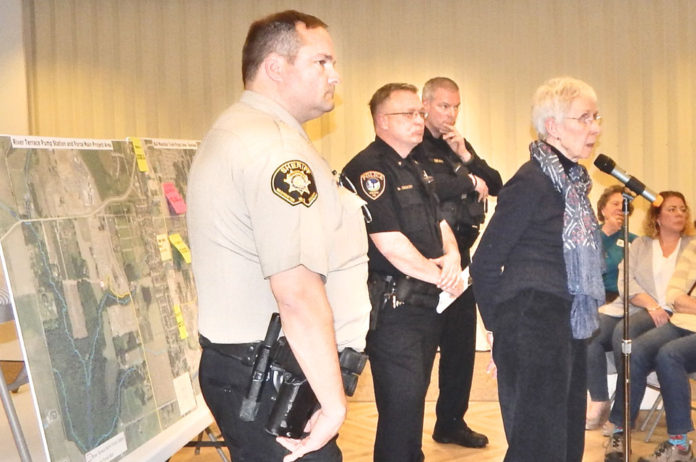
Luckily for the homeless residents of Washington County, they have a team of law enforcement personnel and volunteers working diligently to support their current needs and find long-term solutions.
Several of those actively involved on the front lines spoke at the well-attended March 19 joint meeting of Citizen Participation Organizations 4K (King City) and 4B (Bull Mountain/Tigard) at the Highlands Clubhouse.
First up was Carol Herron, who is chair of the St. Anthony Steering Committee and a volunteer with the church’s severe weather shelter program that operated every Saturday night November through March as well as during severe weather.
“These people are ‘house-less,’ not homeless, because they create homes for themselves, but they are being rousted out of them, and they are living among us,” she said. “Those we have served this year are from several states, and some are autistic or schizophrenic. The longer they are homeless, the more they are likely to suffer from PTSD (post-traumatic stress disorder), and then you add alcohol to the mix. This is not a desired state of affairs.”
According to Herron, shelters are available in Washington County every night of the week, but there are vast distances between them in the sprawling county. Shelters range from Tigard to Forest Grove to Beaverton, and the homeless must somehow get to them each day.
“Some shelters provide bus tickets,” said Herron, adding that “it is good to be involved with those who are appreciative.”
More help is on the way, with Just Compassion opening a day center on Hall Boulevard in Tigard, and “the library system is the greatest day center in the world,” said Herron, adding “ The house-less are a community of individuals who are protective of each other.”
Neil Charlton with the Tigard Police Department, Pat Dean with the King City Police Department and Dave Shook with the Washington County Sheriff’s Office all deal with the homeless on a regular basis.
“Over the last eight months, I have recognized the need to do more with the homeless campers and have found a lot of great resources, but there are not a lot of shelter beds and not enough coordination,” Shook said. “We need more money for more services… and all deputies get mental health training.”
Charlton discussed the legal steps that must be followed to remove illegal campers, pointing out that there have been several active camps in Tigard that police have had to deal with.
Dean of King City noted that “we haven’t had large camps but we have had spillover from other areas. Some are house-less, and some have mental issues. We try to connect them with the right resources and try to help them out as best we can. We have handed out fliers about homeless shelters.”
A member of the audience, Star Stauffer, got involved in the discussion, saying that she lives in the King City area but works in downtown Portland and is a volunteer there helping the homeless. “Some of them can’t get enough money for the first and last months’ rent plus a deposit for an apartment, which keeps them living on the streets,” she said. “We try to guide people to shelters. Some have kids, and parents who are undocumented are afraid their status will be revealed. We’ve been looking for faith-based groups to help, but the numbers of homeless will grow by the thousands.”
A pamphlet on the severe shelter program handed out by Herron included some quotes from homeless people, with one writing, “It is a miracle you exist. My friend in an Oregon town that has over 200 churches does not have one shelter to sleep in at all.”
And another wrote, “The only thing I look for is a little compassion, companionship and a safe, dry cubbyhole to snooze a few hours one day a week. Bless you all!!”





















